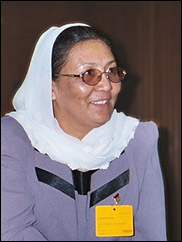
Back to COLLABORATION OUTSIDE THE UN SYSTEM
Joint workshop of
the United Nations Inter-agency Network on Women and Gender Equality
and the OECD-DAC Network on Gender Equality
( OECD, Paris, 10-11 July 2003 )
Final Communiqué:
Gender and post-conflict reconstruction: lessons learned from Afghanistan"Our challenges are enormous but our determination is greater than the challenges we face" - Madame Habiba Sarabi, Minister of Women's Affairs, Afghanistan.
Women often bear the brunt of violent conflict but also have a vital role to play in reconstruction processes. Recent events in Afghanistan have raised renewed hopes worldwide that this would mark a new era of freedom and empowerment for Afghan women and girls. Experience is showing that accomplishing this is no easy task.

A joint United Nations and OECD-DAC workshop in Paris on gender and post-conflict reconstruction drew on lessons from Afghanistan and elsewhere. The workshop identified challenges and constraints as well as good practice for achieving gender equality and meeting women's needs more effectively in humanitarian assistance and recovery; reconstruction of the political, public and security sectors; promotion of economic and social development; and human rights protection and legal reform.
The workshop brought together Afghanistan women leaders, including Madame Habiba Sarabi, the Minister of Women's Affairs, staff of United Nations' entities, representatives of OECD DAC member countries and civil society, and gender and post-conflict experts with field experience in reconstruction.
The Bonn Agreement (2001) paved the way for the establishment of a Ministry of Women's Affairs as part of the new Afghanistan administration. It called for the establishment of a broad-based, multi-ethnic, fully representative, gender-sensitive Government. It recognised, as did the landmark United Nations Security Council resolution 1325 (2000), that the participation of women and attention to their rights and status are critical to national peace and reconstruction processes.
Reconstruction programmes, based on human rights principles, can avoid perpetuating situations of inequality and discrimination and lead to the creation of more equitable and sustainable societies. A safe environment, free from violence, is a precondition for achieving this.
Key lessons learned
Drawing on experiences from Afghanistan and elsewhere, the workshop identified the essential elements for an equitable gender-sensitive reconstruction process. These should take full account of the rights of both women and men by:

- ensuring sufficient attention to the urgent need for improved security – including protection and assistance for those at risk
- acknowledging that building sustainable peace, based on mutual respect, cultural diversity and gender equality, requires long-term efforts and commitment to complex social transformation and donor pressures to focus only on immediate results should therefore be avoided
- providing coordinated international support that strengthens national efforts and ownership, including to national women's machineries, and ensures coherence between technical assistance needs for capacity building and the provision of resources
- ensuring a high level of political will and commitment from all key stakeholders so that reconstruction efforts involve and benefit women as well as men
- applying a gender perspective to conflict analysis and needs assessments at an early stage as the foundation for the development of sectoral plans and mission mandates and enabling full participation of women in policy formulation
- empowering women in the political transformation including by supporting them to identify their needs and interests and by providing incentives to men to support women's full participation in governance processes at all levels
- developing gender responsive approaches to policy formulation, budget allocations and monitoring including through the collection and use of sex-disaggregated data
The way forward
The workshop also made proposals for strengthening international support for Afghanistan and building on this to ensure dynamic gender perspectives in future post conflict reconstruction efforts. The international community should:
in Afghanistan
- support the efforts of the Ministry of Women's Affairs to work with other Government ministries to incorporate gender perspectives in sectoral plans and policies, including through adequate national budget support
- immediately fill and adequately support the position of senior gender advisor in the United Nations Assistance Mission in Afghanistan, in consultation with the Ministry of Women's Affairs
- help facilitate implementation of the UN Convention on the Elimination of All Forms of Discrimination against Women (CEDAW) which is a key means of realising women's human rights, including by strengthening reporting capacity
- strengthen the Afghan inter-agency gender network and ensure it is well-functioning and resourced.
... and in addition
- actively engage men working with women in the process of change and develop their capacity to understand the value of, and actively support, women's empowerment for economic and social development
- acknowledge the need for cultural sensitivity and historical awareness in designing approaches and providing support to reconstruction programmes and to local efforts to increase respect for universal human rights, norms and values
- ensure the provision of gender advisory capacity and gender sensitivity training for all staff in all peace missions and processes
- recognise the importance of reconciliation as an integral part of peace building processes and ensuring that justice is not only done but seen to be done
- develop a strategic and long-term perspective transcending short-term solutions and quick fixes including support to local communities as a way to induce a sustained process of social transformation in support of gender equality.


